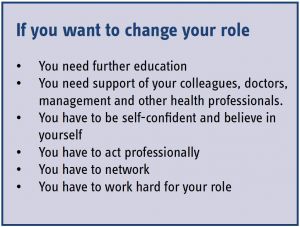Perspective from Malta

First of all I would like to thank the European Association of Urology Nurses (EAUN) for providing me the opportunity to attend the EAUN Conference in Munich through a grant.
It was an extraordinary, inspiring event and my first conference since I have become an EAUN member three years ago. Becoming an EAUN member helped me engage in urology practice and international conferences such those organised by the EAUN facilitate the exchange of knowledge and clinical expertise.
The EAUN meeting was professionally organised, informative and interesting and gave me the opportunity to broaden my knowledge particularly in uro-oncology, my area of interest. As a charge nurse working at a urology ward in Malta for the last five years, I coordinate the intravesical therapy for bladder cancer patients and the administration of zoledronic acid treatment for patients with prostate cancer and bone metastasis. The conference was an inspiring experience and boosted my motivation to work in the field of uro-oncology.
Take home messages
The meeting also gave the opportunity to evaluate current nursing practices, assess the standards we have and how we can achieve a more evidence-based practice. I also reflected on my leadership skills after I met nurses from other countries who have specific roles such as nurse clinician, advanced practice nurse or a chairperson of a multidisciplinary team. They all make a difference in the care of the urological cancer patients by providing information and support during the decision-making process and after hospital discharge.
“Urology Nurses are like icebergs, you only see a fifth of what they do.”
In Malta, urology nursing is still not acknowledged as a speciality and while I was reflecting on our practices it is evident that we do give the physical care that the patient requires while in hospital but unfortunately we do not provide the necessary support to patients who were diagnosed with a cancer (renal, bladder, penile or prostate) or after they underwent a major operation such as cystectomy and were discharged from hospital. This might be due to work overload and shortage of staff. This was shown by L. Drudge Coates (Saturday, 12th) when he said that ‘Urology Nurses are like iceberg, you only see a fifth of what they do.’ His statement described our work in the urology wards in Malta. We are competent in dealing with all sorts of complexities, ranging from difficult catheterisation to the instillation of intravesical therapy. Yet I believe that we regard the patient as someone which requires “repairing” and less as a person who needs the full support of our health care system. I believe that an important element is missing: that besides the individualised care given to the patient, we also have the crucial role to act as a link between the patient and the doctor.
Throughout the conference the role of the nurse as a direct link to patients within a multi-disciplinary team has been stressed. The urology nurse can have a pivotal and active role in the care pathway of the patients from active surveillance to nurse-led clinics. In these settings, the patient can have direct contact with the nurse to discuss concerns related to his illness, enabling cancer patients to make informed decisions with regards the treatment pathway and ensure their compliance.
Again, to quote Drudge-Coates during his talk in the opening plenary session: “Urology nurses’ practice needs a change as society is changing and we need to keep up with changing demands of society. If you don’t change, you die.” It is our goal in Malta that we will move towards a more specialised role in urology by means of education, research and evidence-based practice.
On a positive note, after having attended the EAUN-ESU course on instillations in NMIBC on Saturday 12, I am proud to say that in my clinic we comply with the guidelines on Intravesical Instillation (EAUN, 2015). There are some changes that are required such as the use of luer lock connected to the catheter during instillation and to flush the catheter with saline to avoid any spillages after instillation. Additionally, I will initiate staff education to reinforce such guidelines which are related to health and safety, and using the resources available on the website of the conference.
Research as a pillar
Research is one of the pillars of the EAUN strategies and the professionally created posters presented during the conference confirmed this. One of the posters illustrating a research conducted by nurses from Israel titled ‘Choice and insertion of the urinary catheter comparison of urologic vs. internal medicine department nurses’ (Balin & Yakir) inspired me because as an infection control nurse, our team in Malta is planning to carry out a similar study. The Israeli study made me realise that despite the difficulty of carry out such a research due to the lack of time, our experience in Malta share something in common with the findings of the Israel study and this inspires me to proceed with our own study.
To conclude, my thanks to all the organisers for such a dynamic meeting which do not only inspire but also gave a very welcome to all and for providing the chance to meet other nurses who share the same goals. My gratitude also to Ms. Hanneke Lurvink for her hard work as EAUN Coordinator and for helping me with the arrangements and approval of the grant. I do hope I can join the next EAUN conference in London 2017. I am also looking forward to my EAUN fellowship this September at the Antoni Van Leeuwenhoek Netherlands Cancer Institute.
Let me share one of the inspiring slides from the conference during the session ‘The pivotal role of the nurse in managing mCRPC: collaborating to improve patient care’, which I am sure will help me work towards improving both the clinical care and educational development for both staff and patients.

Helen Attard Bason, Health Department, Mater Dei Hospital, Urology Ward, B’kara (MT), habason@maltanet.net

